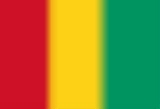
Outline of Guinea
Encyclopedia
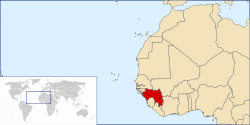
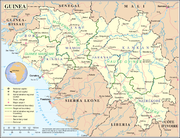
West Africa
West Africa or Western Africa is the westernmost region of the African continent. Geopolitically, the UN definition of Western Africa includes the following 16 countries and an area of approximately 5 million square km:-Flags of West Africa:...
, that was formerly known as French Guinea
French Guinea
French Guinea was a French colonial possession in West Africa. Its borders, while changed over time, were in 1958 those of the independent nation of Guinea....
. Guinea's territory has a curved shape, with its base at the Atlantic Ocean
Atlantic Ocean
The Atlantic Ocean is the second-largest of the world's oceanic divisions. With a total area of about , it covers approximately 20% of the Earth's surface and about 26% of its water surface area...
, inland to the east, and turning south. The base borders Guinea-Bissau
Guinea-Bissau
The Republic of Guinea-Bissau is a country in West Africa. It is bordered by Senegal to the north, and Guinea to the south and east, with the Atlantic Ocean to its west....
and Senegal
Senegal
Senegal , officially the Republic of Senegal , is a country in western Africa. It owes its name to the Sénégal River that borders it to the east and north...
to the north, and Mali
Mali
Mali , officially the Republic of Mali , is a landlocked country in Western Africa. Mali borders Algeria on the north, Niger on the east, Burkina Faso and the Côte d'Ivoire on the south, Guinea on the south-west, and Senegal and Mauritania on the west. Its size is just over 1,240,000 km² with...
to the north and north-east; the inland part borders Côte d'Ivoire
Côte d'Ivoire
The Republic of Côte d'Ivoire or Ivory Coast is a country in West Africa. It has an area of , and borders the countries Liberia, Guinea, Mali, Burkina Faso and Ghana; its southern boundary is along the Gulf of Guinea. The country's population was 15,366,672 in 1998 and was estimated to be...
to the south-east, Liberia
Liberia
Liberia , officially the Republic of Liberia, is a country in West Africa. It is bordered by Sierra Leone on the west, Guinea on the north and Côte d'Ivoire on the east. Liberia's coastline is composed of mostly mangrove forests while the more sparsely populated inland consists of forests that open...
to the south, and Sierra Leone
Sierra Leone
Sierra Leone , officially the Republic of Sierra Leone, is a country in West Africa. It is bordered by Guinea to the north and east, Liberia to the southeast, and the Atlantic Ocean to the west and southwest. Sierra Leone covers a total area of and has an estimated population between 5.4 and 6.4...
to the west of the southern tip. Its water sources include the Niger
Niger River
The Niger River is the principal river of western Africa, extending about . Its drainage basin is in area. Its source is in the Guinea Highlands in southeastern Guinea...
, Senegal
Sénégal River
The Sénégal River is a long river in West Africa that forms the border between Senegal and Mauritania.The Sénégal's headwaters are the Semefé and Bafing rivers which both originate in Guinea; they form a small part of the Guinean-Malian border before coming together at Bafoulabé in Mali...
, and Gambia
Gambia River
The Gambia River is a major river in West Africa, running from the Fouta Djallon plateau in north Guinea westward through Senegal and The Gambia to the Atlantic Ocean at the city of Banjul...
rivers. Guinea is sometimes called Guinea-Conakry (Conakry being its capital) to differentiate it from the neighboring Guinea-Bissau
Guinea-Bissau
The Republic of Guinea-Bissau is a country in West Africa. It is bordered by Senegal to the north, and Guinea to the south and east, with the Atlantic Ocean to its west....
(whose capital is Bissau
Bissau
Bissau is the capital city of Guinea-Bissau. The city's borders are conterminous with the Bissau Autonomous Sector. In 2007, the city had an estimated population of 407,424 according to the Instituto Nacional de Estatística e Censos...
).
The following outline is provided as an overview of and topical guide to Guinea:
General reference
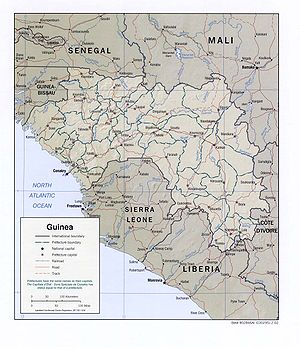
- Pronunciation: ˈɡɪni
- Common English country names: GuineaGuineaGuinea , officially the Republic of Guinea , is a country in West Africa. Formerly known as French Guinea , it is today sometimes called Guinea-Conakry to distinguish it from its neighbour Guinea-Bissau. Guinea is divided into eight administrative regions and subdivided into thirty-three prefectures...
or Guinea-Conakry - Official English country name: The Republic of Guinea
- Common endonym(s):
- Official endonym(s):
- Adjectival(s): Guinean
- Demonym(s):
- EtymologyEtymologyEtymology is the study of the history of words, their origins, and how their form and meaning have changed over time.For languages with a long written history, etymologists make use of texts in these languages and texts about the languages to gather knowledge about how words were used during...
: Name of Guinea - ISO country codes: GN, GIN, 324
- ISO region codes: See ISO 3166-2:GNISO 3166-2:GNISO 3166-2:GN is the entry for Guinea in ISO 3166-2, part of the ISO 3166 standard published by the International Organization for Standardization , which defines codes for the names of the principal subdivisions of all countries coded in ISO 3166-1.Currently for Guinea, ISO 3166-2 codes are...
- InternetInternetThe Internet is a global system of interconnected computer networks that use the standard Internet protocol suite to serve billions of users worldwide...
country code top-level domainCountry code top-level domainA country code top-level domain is an Internet top-level domain generally used or reserved for a country, a sovereign state, or a dependent territory....
: .gn.gn.gn is the country code top-level domain for Guinea. A local contact is required to register a domain name under .gn.-Second level domains:* .com.gn: Commercial* .ac.gn: Academic* .gov.gn: Government* .org.gn: Non-profit...
Geography of Guinea
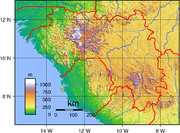
- Guinea is: a country
- Population of Guinea: 9,370,000 - 87th most populous country
- Area of Guinea: 245,857 km2
- Atlas of Guinea
Location
- Guinea is situated within the following regions:
- Northern HemisphereNorthern HemisphereThe Northern Hemisphere is the half of a planet that is north of its equator—the word hemisphere literally means “half sphere”. It is also that half of the celestial sphere north of the celestial equator...
and Western HemisphereWestern HemisphereThe Western Hemisphere or western hemisphere is mainly used as a geographical term for the half of the Earth that lies west of the Prime Meridian and east of the Antimeridian , the other half being called the Eastern Hemisphere.In this sense, the western hemisphere consists of the western portions... - AfricaAfricaAfrica is the world's second largest and second most populous continent, after Asia. At about 30.2 million km² including adjacent islands, it covers 6% of the Earth's total surface area and 20.4% of the total land area...
- West AfricaWest AfricaWest Africa or Western Africa is the westernmost region of the African continent. Geopolitically, the UN definition of Western Africa includes the following 16 countries and an area of approximately 5 million square km:-Flags of West Africa:...
- West Africa
- Northern Hemisphere
- Time zoneTime zoneA time zone is a region on Earth that has a uniform standard time for legal, commercial, and social purposes. In order for the same clock time to always correspond to the same portion of the day as the Earth rotates , different places on the Earth need to have different clock times...
: Coordinated Universal TimeCoordinated Universal TimeCoordinated Universal Time is the primary time standard by which the world regulates clocks and time. It is one of several closely related successors to Greenwich Mean Time. Computer servers, online services and other entities that rely on having a universally accepted time use UTC for that purpose...
UTC+00 - Extreme points of Guinea
- High: Mont Nimba 1752 m (5,748 ft)
- Low: North Atlantic Ocean 0 m
- Land boundaries: 3,399 km
 Mali 858 km
Mali 858 km Sierra Leone 652 km
Sierra Leone 652 km Côte d'Ivoire 610 km
Côte d'Ivoire 610 km Liberia 563 km
Liberia 563 km Guinea-Bissau 386 km
Guinea-Bissau 386 km Senegal 330 km
Senegal 330 km
- Coastline: North Atlantic Ocean 320 km
Environment of Guinea
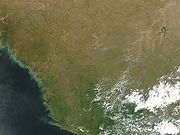
- Climate of Guinea
- Environmental issues in Guinea
- Ecoregions in Guinea
- Renewable energy in Guinea
- Geology of Guinea
- Protected areas of Guinea
- Biosphere reserves in Guinea
- National parks of Guinea
- Wildlife of GuineaWildlife of GuineaThe wildlife of Guinea is composed of its flora and fauna.-Mammals:*Guinea Baboon*Red River Hog-Birds:*Blue-headed Wood-dove*Iris Glossy-starling*White-necked Rockfowl*White-breasted Guineafowl...
- Flora of Guinea
- Fauna of Guinea
- Birds of Guinea
- Mammals of Guinea
Natural geographic features of Guinea
- Glaciers in Guinea: none
- Islands of Guinea
- Lakes of Guinea
- Mountains of Guinea
- Volcanoes in Guinea
- Rivers of Guinea
- Waterfalls of Guinea
- Valleys of Guinea
- World Heritage Sites in Guinea
Ecoregions of Guinea
- Main article: Ecoregions in Guinea
Administrative divisions of Guinea
- Main article: Administrative divisions of Guinea
- Regions of GuineaRegions of Guinea||Guinea is divided into 8 administrative regions which are further subdivided into 34 prefectures.*Boké Region*Conakry Region*Faranah Region*Kankan Region*Kindia Region*Labé Region*Mamou Region*Nzérékoré Region-See also:*ISO 3166-2:GN...
- Prefectures of GuineaPrefectures of Guinea||Guinea is divided into 8 regions among which the national capital Conakry ranks as a special zone. The other 7 regions are further subdivided into 33 prefectures...
- Prefectures of Guinea
Municipalities of Guinea
- Capital of Guinea: Conakry
- Cities of Guinea
Government and politics of Guinea
- Main article: Government of Guinea and Politics of GuineaPolitics of GuineaPolitics of Guinea takes place in a framework of a presidential republic, whereby the President of Guinea is both head of state and head of government of Guinea. Executive power is exercised by the government. Legislative power is vested in both the government and the National Assembly.-History:A...
- Form of governmentForm of governmentA form of government, or form of state governance, refers to the set of political institutions by which a government of a state is organized. Synonyms include "regime type" and "system of government".-Empirical and conceptual problems:...
: presidentialPresidential systemA presidential system is a system of government where an executive branch exists and presides separately from the legislature, to which it is not responsible and which cannot, in normal circumstances, dismiss it....
republicRepublicA republic is a form of government in which the people, or some significant portion of them, have supreme control over the government and where offices of state are elected or chosen by elected people. In modern times, a common simplified definition of a republic is a government where the head of... - Capital of Guinea: Conakry
- Elections in GuineaElections in GuineaElections in Guinea gives information on election and election results in Guinea.Guinea elects on national level a head of state - the president - and a legislature. The president is elected for a five year term by the people...
- (specific elections)
- Political parties in Guinea
- Political scandals of Guinea
- Taxation in Guinea
Executive branch of the government of Guinea
- Head of stateHead of StateA head of state is the individual that serves as the chief public representative of a monarchy, republic, federation, commonwealth or other kind of state. His or her role generally includes legitimizing the state and exercising the political powers, functions, and duties granted to the head of...
: President of Guinea, - Head of governmentHead of governmentHead of government is the chief officer of the executive branch of a government, often presiding over a cabinet. In a parliamentary system, the head of government is often styled prime minister, chief minister, premier, etc...
: Prime Minister of Guinea, - Cabinet of Guinea
Legislative branch of the government of Guinea
- Parliament of Guinea (bicameral)
- Upper houseUpper houseAn upper house, often called a senate, is one of two chambers of a bicameral legislature, the other chamber being the lower house; a legislature composed of only one house is described as unicameral.- Possible specific characteristics :...
: Senate of Guinea - Lower houseLower houseA lower house is one of two chambers of a bicameral legislature, the other chamber being the upper house.Despite its official position "below" the upper house, in many legislatures worldwide the lower house has come to wield more power...
: House of Commons of Guinea
- Upper house
Judicial branch of the government of Guinea
- Supreme Court of Guinea
Foreign relations of Guinea
- Diplomatic missions in Guinea
- Diplomatic missions of GuineaDiplomatic missions of GuineaThis is a list of diplomatic missions of Guinea, excluding honorary consulates. Guinea's relations with other countries, including with West African neighbors, have improved steadily since 1985. Guinea reestablished relations with France and Germany in 1975, and with neighboring Côte d'Ivoire and...
International organization membership
The Republic of Guinea is a member of:- African, Caribbean, and Pacific Group of States (ACP)
- African Development Bank Group (AfDB)
- African UnionAfrican UnionThe African Union is a union consisting of 54 African states. The only all-African state not in the AU is Morocco. Established on 9 July 2002, the AU was formed as a successor to the Organisation of African Unity...
(AU) - Economic Community of West African StatesEconomic Community of West African StatesThe Economic Community of West African States is a regional group of fifteen West African countries. Founded on 28 May 1975, with the signing of the Treaty of Lagos, its mission is to promote economic integration across the region....
(ECOWAS) - Food and Agriculture OrganizationFood and Agriculture OrganizationThe Food and Agriculture Organization of the United Nations is a specialised agency of the United Nations that leads international efforts to defeat hunger. Serving both developed and developing countries, FAO acts as a neutral forum where all nations meet as equals to negotiate agreements and...
(FAO) - Group of 77Group of 77The Group of 77 at the United Nations is a loose coalition of developing nations, designed to promote its members' collective economic interests and create an enhanced joint negotiating capacity in the United Nations. There were 77 founding members of the organization, but the organization has...
(G77) - International Bank for Reconstruction and DevelopmentInternational Bank for Reconstruction and DevelopmentThe International Bank for Reconstruction and Development is one of five institutions that compose the World Bank Group. The IBRD is an international organization whose original mission was to finance the reconstruction of nations devastated by World War II. Now, its mission has expanded to fight...
(IBRD) - International Civil Aviation OrganizationInternational Civil Aviation OrganizationThe International Civil Aviation Organization , pronounced , , is a specialized agency of the United Nations. It codifies the principles and techniques of international air navigation and fosters the planning and development of international air transport to ensure safe and orderly growth...
(ICAO) - International Criminal CourtInternational Criminal CourtThe International Criminal Court is a permanent tribunal to prosecute individuals for genocide, crimes against humanity, war crimes, and the crime of aggression .It came into being on 1 July 2002—the date its founding treaty, the Rome Statute of the...
(ICCt) - International Criminal Police Organization (Interpol)
- International Development AssociationInternational Development AssociationThe International Development Association , is the part of the World Bank that helps the world’s poorest countries. It complements the World Bank's other lending arm — the International Bank for Reconstruction and Development — which serves middle-income countries with capital investment and...
(IDA) - International Federation of Red Cross and Red Crescent SocietiesInternational Federation of Red Cross and Red Crescent SocietiesThe International Federation of Red Cross and Red Crescent Societies is a humanitarian institution that is part of the International Red Cross and Red Crescent Movement along with the ICRC and 186 distinct National Societies...
(IFRCS) - International Finance CorporationInternational Finance CorporationThe International Finance Corporation promotes sustainable private sector investment in developing countries.IFC is a member of the World Bank Group and is headquartered in Washington, D.C., United States....
(IFC) - International Fund for Agricultural DevelopmentInternational Fund for Agricultural DevelopmentThe International Fund for Agricultural Development , a specialized agency of the United Nations, was established as an international financial institution in 1977 as one of the major outcomes of the 1974 World Food Conference. IFAD is dedicated to eradicating rural poverty in developing countries...
(IFAD) - International Labour OrganizationInternational Labour OrganizationThe International Labour Organization is a specialized agency of the United Nations that deals with labour issues pertaining to international labour standards. Its headquarters are in Geneva, Switzerland. Its secretariat — the people who are employed by it throughout the world — is known as the...
(ILO) - International Maritime OrganizationInternational Maritime OrganizationThe International Maritime Organization , formerly known as the Inter-Governmental Maritime Consultative Organization , was established in Geneva in 1948, and came into force ten years later, meeting for the first time in 1959...
(IMO) - International Monetary FundInternational Monetary FundThe International Monetary Fund is an organization of 187 countries, working to foster global monetary cooperation, secure financial stability, facilitate international trade, promote high employment and sustainable economic growth, and reduce poverty around the world...
(IMF) - International Olympic CommitteeInternational Olympic CommitteeThe International Olympic Committee is an international corporation based in Lausanne, Switzerland, created by Pierre de Coubertin on 23 June 1894 with Demetrios Vikelas as its first president...
(IOC) - International Organization for MigrationInternational Organization for MigrationThe International Organization for Migration is an intergovernmental organization. It was initially established in 1951 as the Intergovernmental Committee for European Migration to help resettle people displaced by World War II....
(IOM) - International Organization for StandardizationInternational Organization for StandardizationThe International Organization for Standardization , widely known as ISO, is an international standard-setting body composed of representatives from various national standards organizations. Founded on February 23, 1947, the organization promulgates worldwide proprietary, industrial and commercial...
(ISO) (correspondent) - International Red Cross and Red Crescent MovementInternational Red Cross and Red Crescent MovementThe International Red Cross and Red Crescent Movement is an international humanitarian movement with approximately 97 million volunteers, members and staff worldwide which was founded to protect human life and health, to ensure respect for all human beings, and to prevent and alleviate human...
(ICRM) - International Telecommunication UnionInternational Telecommunication UnionThe International Telecommunication Union is the specialized agency of the United Nations which is responsible for information and communication technologies...
(ITU) - International Telecommunications Satellite OrganizationInternational Telecommunications Satellite OrganizationThe International Telecommunications Satellite Organization is an intergovernmental organisation charged with overseeing the public service obligations of Intelsat.-External links:*...
(ITSO) - International Trade Union ConfederationInternational Trade Union ConfederationThe International Trade Union Confederation is the world's largest trade union federation. It was formed on November 1, 2006 out of the merger of the International Confederation of Free Trade Unions and the World Confederation of Labour...
(ITUC)
- Inter-Parliamentary Union (IPU)
- Islamic Development BankIslamic Development BankThe Islamic Development Bank is a multilateral development financing institution located in Jeddah, Saudi Arabia. It was founded by the first conference of Finance Ministers of the Organisation of the Islamic Conference , convened 23 Dhu'l Qa'dah 1393 AH.The bank officially began its activities on...
(IDB) - Multilateral Investment Guarantee AgencyMultilateral Investment Guarantee AgencyThe Multilateral Investment Guarantee Agency is a member organization of the World Bank Group that offers political risk insurance. It was established to promote foreign direct investment into developing countries. MIGA was founded in 1988 with a capital base of $1 billion and is headquartered in...
(MIGA) - Nonaligned Movement (NAM)
- Organisation internationale de la Francophonie (OIF)
- Organisation of Islamic Cooperation (OIC)
- Organization for the Prohibition of Chemical Weapons (OPCW)
- United NationsUnited NationsThe United Nations is an international organization whose stated aims are facilitating cooperation in international law, international security, economic development, social progress, human rights, and achievement of world peace...
(UN) - United Nations Conference on Trade and DevelopmentUnited Nations Conference on Trade and DevelopmentThe United Nations Conference on Trade and Development was established in 1964 as a permanent intergovernmental body. It is the principal organ of the United Nations General Assembly dealing with trade, investment, and development issues....
(UNCTAD) - United Nations Educational, Scientific, and Cultural Organization (UNESCO)
- United Nations High Commissioner for RefugeesUnited Nations High Commissioner for RefugeesThe Office of the United Nations High Commissioner for Refugees , also known as The UN Refugee Agency is a United Nations agency mandated to protect and support refugees at the request of a government or the UN itself and assists in their voluntary repatriation, local integration or resettlement to...
(UNHCR) - United Nations Industrial Development OrganizationUnited Nations Industrial Development OrganizationThe United Nations Industrial Development Organization , French/Spanish acronym ONUDI, is a specialized agency in the United Nations system, headquartered in Vienna, Austria...
(UNIDO) - United Nations Mission for the Referendum in Western SaharaUnited Nations Mission for the Referendum in Western SaharaMINURSO is the United Nations peacekeeping mission in Western Sahara. The name is a French acronym for "Mission des Nations Unies pour l'Organisation d'un Référendum au Sahara Occidental" — United Nations Mission for the organization of a Referendum in Western Sahara.-Purpose of the mission:MINURSO...
(MINURSO) - United Nations Mission in the Sudan (UNMIS)
- United Nations Operation in Cote d'IvoireUnited Nations Operation in Côte d'IvoireThe United Nations Operation in Côte d'Ivoire is a peacekeeping mission whose objective is "to facilitate the implementation by the Ivorian parties of the peace agreement signed by them in January 2003"...
(UNOCI) - Universal Postal UnionUniversal Postal UnionThe Universal Postal Union is an international organization that coordinates postal policies among member nations, in addition to the worldwide postal system. The UPU contains four bodies consisting of the Congress, the Council of Administration , the Postal Operations Council and the...
(UPU) - World Confederation of LabourWorld Confederation of LabourThe World Confederation of Labour was an international labour organization founded in 1920 and based in Europe. Totalitarian governments of the 1930s repressed the federation and imprisoned many of its leaders, limiting operations until the end of World War II...
(WCL) - World Customs OrganizationWorld Customs OrganizationThe World Customs Organization is an intergovernmental organization headquartered in Brussels, Belgium. With its worldwide membership, the WCO is recognized as the voice of the global customs community...
(WCO) - World Federation of Trade UnionsWorld Federation of Trade UnionsThe World Federation of Trade Unions was established in 1945 to replace the International Federation of Trade Unions. Its mission was to bring together trade unions across the world in a single international organization, much like the United Nations...
(WFTU) - World Health OrganizationWorld Health OrganizationThe World Health Organization is a specialized agency of the United Nations that acts as a coordinating authority on international public health. Established on 7 April 1948, with headquarters in Geneva, Switzerland, the agency inherited the mandate and resources of its predecessor, the Health...
(WHO) - World Intellectual Property OrganizationWorld Intellectual Property OrganizationThe World Intellectual Property Organization is one of the 17 specialized agencies of the United Nations. WIPO was created in 1967 "to encourage creative activity, to promote the protection of intellectual property throughout the world"....
(WIPO) - World Meteorological OrganizationWorld Meteorological OrganizationThe World Meteorological Organization is an intergovernmental organization with a membership of 189 Member States and Territories. It originated from the International Meteorological Organization , which was founded in 1873...
(WMO) - World Tourism OrganizationWorld Tourism OrganizationThe World Tourism Organization , based in Madrid, Spain, is a United Nations agency dealing with questions relating to tourism. It compiles the World Tourism rankings. The World Tourism Organization is a significant global body, concerned with the collection and collation of statistical information...
(UNWTO) - World Trade OrganizationWorld Trade OrganizationThe World Trade Organization is an organization that intends to supervise and liberalize international trade. The organization officially commenced on January 1, 1995 under the Marrakech Agreement, replacing the General Agreement on Tariffs and Trade , which commenced in 1948...
(WTO)
Law and order in Guinea
- Main article: Law of Guinea
- Capital punishment in Guinea
- Constitution of Guinea
- Crime in Guinea
- Human rights in Guinea
- LGBT rights in GuineaLGBT rights in GuineaLesbian, gay, bisexual, and transgender persons in Guinea face legal challenges not experienced by non-LGBT residents. Both male and female same-sex sexual activity is illegal in Guinea.-Law regarding same-sex sexual activity:...
- Freedom of religion in Guinea
- LGBT rights in Guinea
- Law enforcement in Guinea
Military of Guinea
- Main article: Military of GuineaMilitary of GuineaThe Republic of Guinea Armed Forces are the armed forces of Guinea. They are responsible for the territorial security of Guinea's border and the defence of the country against external attack and aggression....
- Command
- Commander-in-chiefCommander-in-ChiefA commander-in-chief is the commander of a nation's military forces or significant element of those forces. In the latter case, the force element may be defined as those forces within a particular region or those forces which are associated by function. As a practical term it refers to the military...
:- Ministry of Defence of Guinea
- Commander-in-chief
- Forces
- Army of Guinea
- Navy of Guinea
- Air Force of Guinea
- Special forces of Guinea
- Military history of Guinea
- Military ranks of Guinea
History of Guinea
- Main article: History of GuineaHistory of GuineaThe modern state of Guinea did not come into existence until 1958, but the history of the area stretches back well before European intervention. Its current boundaries were deterimined during the colonial period by the Conference of Berlin and the French, who ruled Guinea until 1958.-West African...
, Timeline of the history of Guinea, and Current events of Guinea
- Economic history of Guinea
- Military history of Guinea
Culture of Guinea
- Main article: Culture of Guinea
- Architecture of Guinea
- Cuisine of Guinea
- Ethnic minorities in Guinea
- Festivals in Guinea
- Humor in Guinea
- Languages of GuineaLanguages of GuineaThe Republic of Guinea is a multilingual country, with over 40 languages spoken. The official language is French, which was inherited from colonial rule...
- Media in Guinea
- National symbols of Guinea
- Coat of arms of GuineaCoat of arms of GuineaThe present coat of arms of Guinea was adopted in 1984 and features a dove with a golden olive branch in its beak over a ribbon with "Work justice solidarity". The arms formerly also included a crossed sword and rifle. A Former arms in 1958 features a red and yellow shield with a green elephant on...
- Flag of GuineaFlag of GuineaThe flag of Guinea was adopted on 10 November 1958.- History :The colors of the flag were adapted from those of the Rassemblement Democratique Africaine, the dominant movement at the time of independence. The colors were in turn derived from those of Ghana, which had first adopted them in 1957...
- National anthem of Guinea
- Coat of arms of Guinea
- People of Guinea
- Prostitution in Guinea
- Public holidays in Guinea
- Records of Guinea
- Religion in Guinea
- Buddhism in Guinea
- Christianity in Guinea
- Hinduism in Guinea
- Islam in GuineaIslam in Guinea2005 official statistics for Islam in Guinea estimate that 85% of Guinea's 7.8 million people are Muslim. Most are Sunnis who follow the Maliki legal tradition and Qadiri and Tijani Sufi orders. Ahmadiyya Muslim Community is also present. Although the French established a colony in 1891, their...
- Judaism in Guinea
- Sikhism in Guinea
- World Heritage Sites in Guinea
Art in Guinea
- Art in Guinea
- Cinema of Guinea
- Literature of Guinea
- Music of GuineaMusic of GuineaGuinea is a West African nation, composed of several ethnic groups. Of these, the music of the Mandé has been particularly popular and internationally well-known, even outside of West Africa....
- Television in Guinea
- Theatre in Guinea
Sports in Guinea
- Main article: Sports in Guinea
- Football in GuineaFootball in GuineaThe sport of football in the country of Guinea is run by the Fédération Guinéenne de Football. The association administers the national football team, as well as the national league....
- Guinea at the OlympicsGuinea at the OlympicsGuinea has sent athletes to every Summer Olympic Games held since 1968 except for 1972 and 1976, although the country has never won an Olympic medal. No athletes from Guinea have competed in any Winter Olympic Games....
Economy and infrastructure of Guinea
- Main article: Economy of GuineaEconomy of GuineaGuinea is richly endowed with minerals, possessing an estimated quarter of the world's proven reserves of bauxite, more than 1.8 billion metric tons of high-grade iron ore, significant diamond and gold deposits, and undetermined quantities of uranium. Guinea also has considerable potential for...
- Economic rank, by nominal GDP (2007): 138th (one hundred and thirty eighth)
- Agriculture in GuineaAgriculture in GuineaIn Guinea in western Africa, only 2.6% of the country's arable land area is cultivated, yet agriculture accounts for 24% of the total GDP and employs 84% of the economically active population....
- Banking in Guinea
- National Bank of Guinea
- Communications in GuineaCommunications in GuineaTelephones - main lines in use:11,000 Telephones - mobile cellular:790,000 Telephone system:poor to fair system of open-wire lines, small radiotelephone communication stations, and new microwave radio relay systemdomestic:...
- Internet in Guinea
- Companies of Guinea
- Currency of GuineaCurrencyIn economics, currency refers to a generally accepted medium of exchange. These are usually the coins and banknotes of a particular government, which comprise the physical aspects of a nation's money supply...
: FrancGuinean franc-First Guinean franc:The first Guinean franc was introduced in 1959 to replace the CFA franc. There were 1, 5, 10 and 25 francs coins with banknotes in 50, 100, 500, 1000, 5000 and 10,000 francs denominations. A second series of banknotes was issued in 1960, without the 10,000 francs...
- ISO 4217ISO 4217ISO 4217 is a standard published by the International Standards Organization, which delineates currency designators, country codes , and references to minor units in three tables:* Table A.1 – Current currency & funds code list...
: GNF
- ISO 4217
- Economic history of Guinea
- Energy in Guinea
- Energy policy of Guinea
- Oil industry in Guinea
- Health care in Guinea
- Mining in Guinea
- Guinea Stock Exchange
- Tourism in Guinea
- Transport in GuineaTransport in Guinea- Railways :total:1,086 kmstandard gauge:279 km gaugemetre gauge:807 km gauge The lines do not all connect.- Northern line :...
- Airports in Guinea
- Rail transport in GuineaRail transport in GuineaGuinea has 1,086 km of railways. This includes 279 km at gauge and 807 km at gauge. The latter includes 662 km in common carrier service from Kankan to Conakry.Currently operating in Guinea three different railway companies:...
- Roads in Guinea
- Water supply and sanitation in Guinea
See also
- Index of Guinea-related articles
- List of Guinea-related topics
- List of international rankings
- Member state of the United Nations
- Outline of AfricaOutline of AfricaThe following outline provides an overview of and topical guide to the continent Africa:Africa – world's second largest and second most populous continent, after Asia.-Geography of Africa:* Atlas of Africa* List of cities in Africa...
- Outline of geographyOutline of geographyThe following outline is provided as an overview of and topical guide to geography:Geography – science that studies the lands, features, inhabitants, and phenomena of Earth.- Geography is :...

